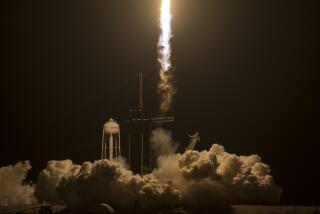Astronautics Continues Its Shuttle Work
- Share via
Despite the indefinite delay of space shuttle launches caused by last week’s explosion of the Challenger, none of the 375 workers assigned to shuttle programs at McDonnell Douglas Corp.’s Astronautics plant in Huntington Beach are scheduled for layoffs, officials said Friday.
According to a company spokesman, work is continuing uninterrupted on McDonnell Douglas’ two shuttle-related contracts. One contract calls for the company to make some parts of the casings that cover the twin solid-fuel rocket boosters. In the other program, McDonnell Douglas designs and is responsible for making and assembling communication satellites for launching during shuttle trips.
“We’re working exactly the way we did before the accident,” the spokesman said, referring to the Jan. 28 explosion of the Challenger which killed all seven astronauts on board. Subsequent flights of the remaining three space shuttles have been delayed while National Aeronautics and Space Administration officials and a special government inquiry commission try to determine the cause of the explosion. The next launch had been set for March 6.
The spokesman said that because the company’s workload is growing rapidly at the Huntington Beach facility, a prolonged delay in the space shuttle program could force a reassignment of some shuttle workers to other operations.
Meanwhile, he said, workers are completing the three satellites originally scheduled to be sent into orbit from the shuttle once scheduled for a June 24 launch. The satellites have been purchased by the Indonesian government, the Westar unit of Western Union and the British military.
The satellites are designed and partially assembled in Huntington Beach and then shipped to the Kennedy Space Center in Florida for final assembly.
The spokesman said the company is also continuing to build the aluminum and steel nose cones, attaching rings and forward and aft skirts that are used in assembling the casings for the two solid-fuel rocket boosters used on each shuttle launch.
More to Read
Inside the business of entertainment
The Wide Shot brings you news, analysis and insights on everything from streaming wars to production — and what it all means for the future.
You may occasionally receive promotional content from the Los Angeles Times.










